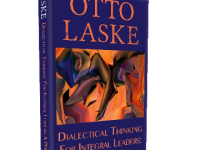Solving real world problems tests professionals’ present level of cognitive development. A good training ground for working on hard problems in teams is the Case Study Cohort Method (CSCM) developed at the Interdevelopmental Institute. The method consists of a having members of a team assessing an individual’s or team’s level of cognitive maturity debate the empirical evidence that speaks in favor of one or the other level of subjects’ cognitive flexibility. Although the material for the debate is “academic”, consisting of a transcription of a 1-hr cognitive interview, the opportunities for sharpening one’s use of dialectical thought forms is the same as in a real-world situation in which an individual or team is looking for solutions. In this paper, I describe both the method and show what it entails to learn to use dialectical thought forms, envisioning that such use could become a social practice with major benefits for solving global economic and political problems. (A reprint from Integral Review 11, no. 3, 2015). DTF as a Tool for Creating Integral Collaborations Read More...
Tag: Otto Laske
Dialectic Interpreted in the Logic of Commerce: A Paradigm for Living in the Anthropocene
This article proposes a new way of thinking about engaging in commercial enterprises meant to safeguard Planet Earth.DIALECTIC INTERPRETED IN THE LOGIC OF COMMERCE Read More...
Nick Shannon on “What Can IDM Offer the Integral Movement?”
In this article, written in response to the 2nd ITC conference (2010), Nick Shannon outlined four main vantage points from which teachings at the Otto Laske Interdevelopmental Institute (IDM) elucidate and strengthen integral thinking: (1) upper left quadrant, (2) dialectical unfolding of concepts, (3) moving from contextual to transformation language, and (4) cognitive development and higher levels of consciousness. Shannon thought that in all of these regards, Otto Laske's teaching clarifies and advances integral thinking. To this day, the promise of this teaching, more recently reinforced by Bhaskar's dialectical writings (1990s), has remained largely unknown or unnoticed. We are reprinting N. Shannon's thoughts here to invite further engagement of integral practitioners with dialectic, a recent topic of Laske's book entitled "Dialectical thinking for integral leaders: A primer" (Integral Publishers, 2015). Shannon, What can IDM offer the Integral Movement Read More...
Growing the Top Management Team: A Developmental View of OD
In this paper co-authored with Barbara Maynes,we outline a developmental view of OD. We show that Argyris "theory in use" points to different levels of mental growth, both social-emotional and cognitive. These levels are seen as the program from which theories of action arise in contributors to an organization. An early version of CDF called DSPT (developmental structure/process tool) is used to substantiate this claim. In the article, we explain the differences between two executives’ theory of action and analyze the dynamic of a six-member team on developmental grounds. By way of close analysis, we show that theories of action are developmentally grounded, and are thus open both to maturation over the life span and to interventions like developmental coaching. We come to the conclusion that developmental assessment of executives and teams should become a vital part of in-house development and of OD intervention. Source: Journal of Management Development, vol. 21.9, 702-729, 2002. Laske-Maynes_Growing_Top_Management_Team Read More...
Executive Development as Adult Development
This article, chapter 9 of Demick et al’s Handbook of Adult Development (Springer 2002), tries to escape the tunnel vision of organizational theorists and consultants alike who, while glorifying leaders, cannot penetrate to the adult-developmental origins of leadership and get lost in psychological or spiritual speculations, or else lists of competences. Instead, the article adopts the distinction between "ontic" and "agentic" development, that is, the development that happens over human resources' life span development, on one hand, and the organizational mechanisms put in place to "develop" them, on the other. The article conceptualizes executive development as a lawful developmental modification of an individual's professional agenda and universe of discourse in the cognitive and social-emotional sense or, to speak with E. Jaques, his/her Size of Person. Refining Argyris, three levels of professional agenda are distinguished. M. W. McCall Jr.'s (1998) and D. T. Hall's writings (1996) are focused on in order to clarify contemporary theorists' views, referring to McCall's "five dilemmas" of human development in organizations. The article focuses on the dialectic of managerial strengths and weaknesses, the organizational shift to the "Proteian" (internal) career, and introduces Kegan's and Basseches' work alongside with empirical findings of the author. Laske, Executive Development... Read More...
The Constructive Developmental Framework (CDF) as a Talent Finder and Work Design Methodology
In this short article, I highlight the resources of the Constructive Developmental Framework for finding organizational talent and designing a work environment that supports its further growth. CDF as a Talent Finder and Work Design Methodology Read More...
